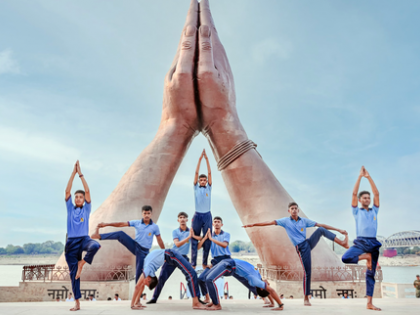Unable to sleep well? Yoga, tai chi, walking may help
By IANS | Updated: July 17, 2025 12:49 IST2025-07-17T12:41:53+5:302025-07-17T12:49:24+5:30
New Delhi, July 17 If you are suffering from insomnia, performing exercises such as yoga, tai chi, walking, ...

Unable to sleep well? Yoga, tai chi, walking may help
New Delhi, July 17 If you are suffering from insomnia, performing exercises such as yoga, tai chi, walking, and jogging may help improve sleep quality, according to a study.
The findings, published in the online journal BMJ Evidence Based Medicine, back the use of exercise as a primary treatment strategy for poor sleep patterns.
Insomnia is characterised by difficulties falling and staying asleep, and early morning awakening. It is associated with heightened risks of various mental and physical health conditions, including dementia and cardiovascular disease.
Drug treatments for insomnia come with side effects, and cognitive behavioural therapy (CBT), while effective, isn’t always available due to the shortage of trained therapists, explained the researchers from Beijing University of Chinese Medicine, China.
“The findings of this study further underscore the therapeutic potential of exercise interventions in the treatment of insomnia, suggesting that their role may extend beyond adjunctive support to serve as viable primary treatment options,” said corresponding author Zhao-lan Liu, from the varsity.
“Although current clinical guidelines make only limited mention of exercise, this study provides relatively comprehensive comparative evidence that may inform the development of more specific and actionable clinical recommendations,” Liu added.
The team conducted a meta-analysis of 22 randomised clinical trials involving 1,348 participants and 13 different treatment approaches to ease insomnia. Of these seven were exercise-based: yoga; tai chi; walking or jogging; aerobic plus strength exercise; strength training alone; aerobic exercise combined with therapy; and mixed aerobic exercises.
The other approaches included CBT; sleep hygiene; ayurveda; acupuncture or massage.
The analysis showed that yoga resulted in a large increase in total sleep time of nearly 2 hours and improved sleep efficiency by nearly 15 per cent. It also reduced the amount of time spent awake after falling asleep by nearly an hour and shortened sleep latency by around half an hour.
Walking or jogging resulted in a large reduction in insomnia severity of nearly 10 points, while tai chi reduced poor sleep quality scores by more than 4 points, increased total sleep time by more than 50 minutes, and reduced time spent awake after falling asleep by over half an hour. It also shortened sleep latency by around 25 minutes, the researchers said.
“Given the advantages of these exercise -- including low cost, minimal side effects, and high accessibility -- the team urged the need for integrating these into primary care and community health programmes.
Disclaimer: This post has been auto-published from an agency feed without any modifications to the text and has not been reviewed by an editor
Open in app